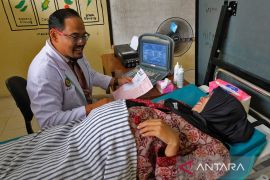According to Basic Health Research (Riskesdas), the proportion of the Indonesian population leading a sedentary lifestyle, or a lifestyle with minimal physical activities, increased from 26.1 percent in 2013 to 33.5 percent in 2018.
"This means one out of three people have a sedentary lifestyle," he noted at an online press conference on Neuropathy Awareness Week on Monday.
The rise in non-communicable diseases will significantly add to the people and the government's burden considering that handling such diseases takes a lot of time, money, and high technology.
Public education campaigns and early detection of non-communicable diseases are the most effective and efficient ways to control risk factors, Nurali informed.
He urged the people to apply CERDIK, which comprises getting routine health checks, stopping smoking, diligently carrying out physical activities, eating a healthy diet, getting enough rest, managing stress, and following a Healthy Community Movement (GERMAS) lifestyle.
He also advised people to reduce salt, sugar, and fat intake to prevent non-communicable diseases, including diabetes.
"And we at the ministry believe that initiatives from stakeholders, including from the private sector and non-governmental organizations (NGOs), will continue to remind the public about this," he remarked.
Through education campaigns, he expects people to be inspired to carry out early detection or health screening as part of the GERMAS lifestyle.
Related news: Number of hypertension patients still climbing: ministry
Nerve damage
One particular non-communicable disease that has become necessary to monitor is nerve damage or neuropathy.
Neurophysiology expert Dr. Manfaluthy Hakim said that neuropathy is a disorder of the peripheral nervous system whose general symptoms include numbness, tingling, prickling feeling, and burning sensation on hands and feet.
"Peripheral nervous (system) connects the central nervous system with all of the important parts of the body," he added.
He urged people to be aware of neuropathy symptoms and conduct early detection so that medication, including neurotrophic vitamins, can be provided from an early stage.
"This (early detection) aims to prevent more severe impacts of neuropathy because nerve damage can be irreversible if more than 50 percent of nerve fibers have been damaged," he informed.
Related news: Non-communicable disease trend increases in Indonesia
Translator: Rizka K, Fadhli Ruhman
Editor: Rahmad Nasution
Copyright © ANTARA 2022











